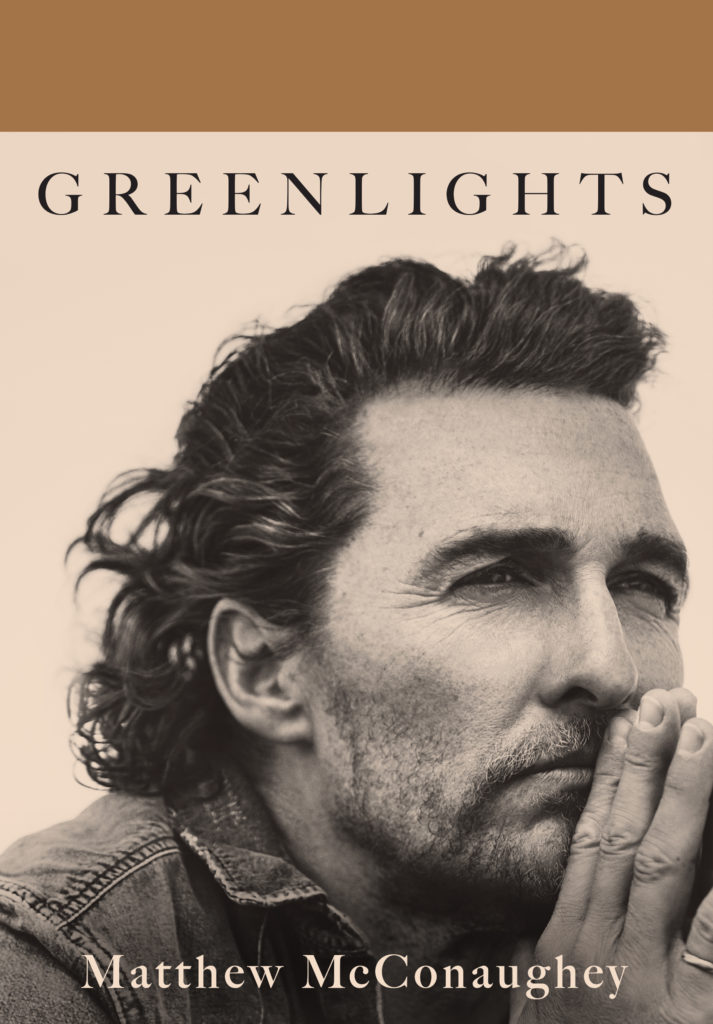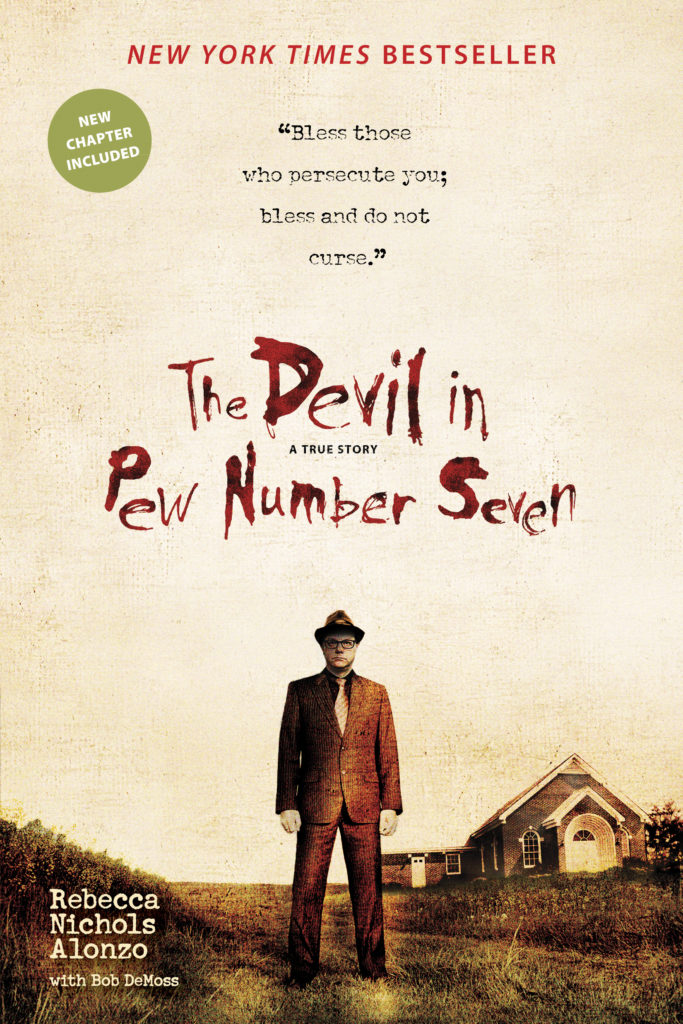Life’s Green Light & Red Light Moments: Matthew McConaughey & Rebecca Alonzo
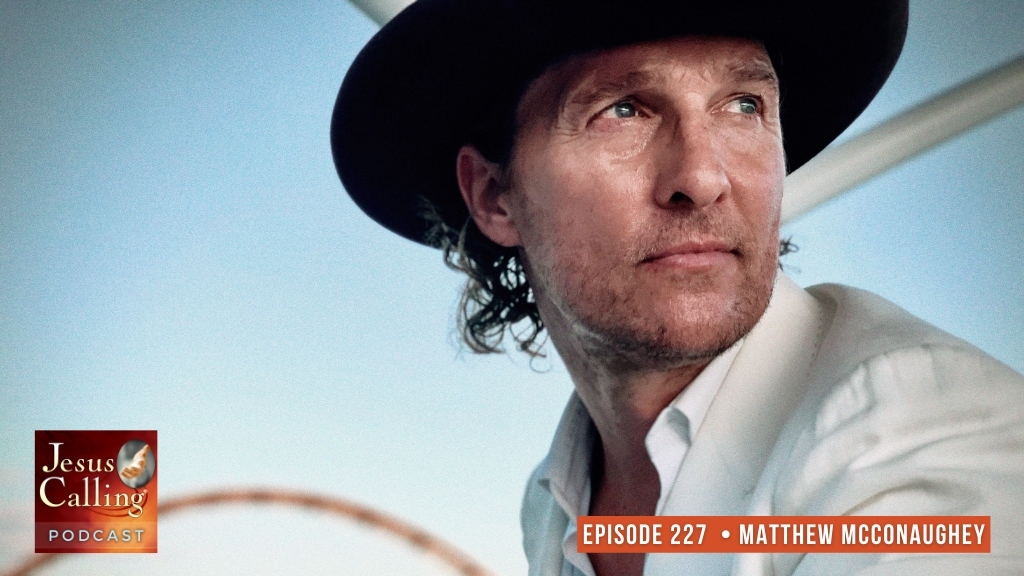
Matthew McConaughey: I think everyone has an innate quest to be a little better, be a little more true to themselves. And I think, you know, we have to disseminate what kind of green lights we’re looking for. So where it’s either been divinely written and where we’re responsible, where our hands are on the wheel, but God’s laying out the highway or, you know, when that pavement is put under our proverbial wheels, though what has already been written. That’s a dance.
Life’s Green Light & Red Light Moments: Matthew McConaughey & Rebecca Alonzo – Episode #227
Narrator: Welcome to the Jesus Calling Podcast. Throughout the course of our lives, we all encounter “green light” moments—those times where we know or feel God leading us in the direction we should go. But then there are the “red light “ moments that stop us in our tracks and have us wondering which way to go next. Actor Matthew McConaughey and author/speaker Rebecca Alonzo share their red and greenlight moments, what they learned, and how they survived.
Academy Award winner Matthew McConaughey is an actor, a husband, and a proud father of three kids. An avid journaler, Matthew kept a diary of his life over thirty-six years. He recently took the time to review the stories that made up the thread of his past and present, his good choices and bad choices, and compiled them into a memoir called Greenlights, which he hopes will inspire others to look at their own stories and recognize the “green light” moments in their own lives.
Matthew McConaughey: Hello, everyone. Matthew David McConaughey here. I just turned fifty-one years young, happily married, father of three. And my favorite project lately is the one that hopefully you either have or are going to hear about, which is Greenlights. It’s a book, a recollection of my last fifty. Sure did have a great time writing it so you can enjoy the read as much as I enjoyed the ride.
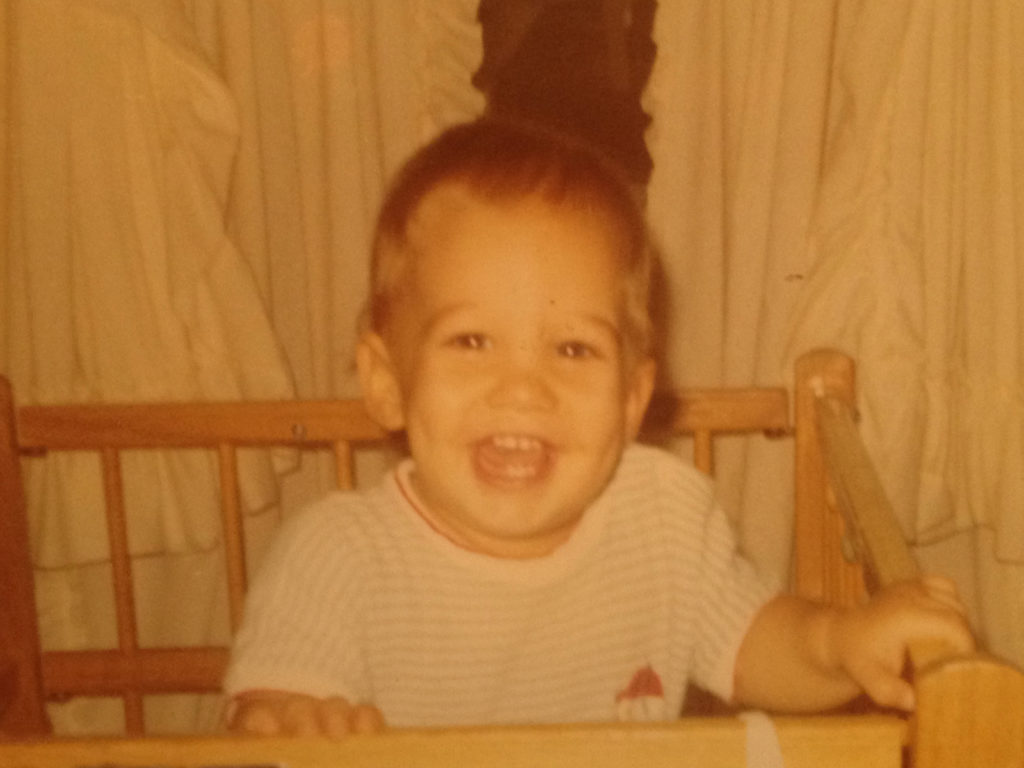
I was the youngest son of three of two older brothers: Pat’s my older brother, who’s fifty-seven or fifty-eight now, and then Mike was the oldest one who’s sixty-four, sixty-five. We were raised Methodist. I went to church every Sunday, we were pretty active in the youth groups on Sunday evenings and sometimes Wednesdays. You know, what has become an extended church is we always went around the horn and said our prayers of gratitude before meals, which I still continue to do to this day.
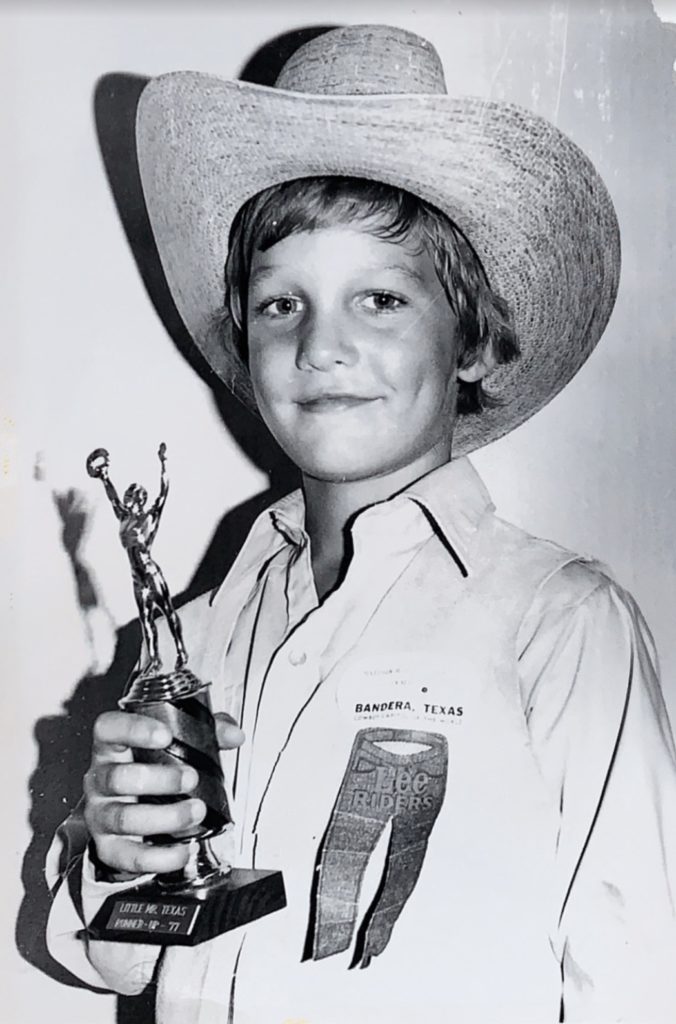
Methodists are a lot about thanks, an awful lot of gratitude for being thankful for what we have. And that belief has helped lead me to understand, to believe that the more we’re thankful for, the more we will create in our lives to be thankful for. I do believe that’s a fact.
The Road to Success in Acting
So I’m in Austin, Texas, going to the University of Texas at Austin—it’s the summer between my junior and senior year, the previous year, I had just switched my course direction over to film production. So I was interested in storytelling, but hadn’t really done anything in front of the camera. I met a man in a bar. I introduced myself to him at a bar one night, who I was told was in town producing a film. I went down, read the part, I got the part. I finished that. It was an awesome summer.
I was doing this thing called acting that I love doing. People were telling me I was good at it. They were paying me 320 bucks a day for it. I was like, Are you kidding? Is this legal? So I went back to school, made better films because of the experience I had had on set acting, and then packed up my U-Haul and drove out west to go sleep on the couch of that man that I met in the bar that night that gave me my first job and tried to start a career in acting or something in production.
And it worked out pretty quickly for me. I don’t have that story of having to work all these other jobs before I got acting. My first two auditions in Hollywood were for Angels in the Outfield and Boys on the Side, both of them I got, actually.
Big success came. I mean, I got famous when I did a film, A Time to Kill, and that was the biggest sort of hinge point in my career, where all of a sudden great affluence was coming my way, any script I wanted to do, everybody saying, “I love you,” and me questioning, Woah, why is everyone throwing that word around? Because where I came from, you didn’t throw that word around.
And I did go through an, Okay, I need to figure out what matters and what doesn’t, because over one weekend my life changed so much. And if, you know, if two days ago, you’re looking at all these things that you don’t even have the option of doing, and you’re talking about gratitude, I would do any of those. And forty-eight hours later, because of the success of a film in my situation, A Time to Kill, all of a sudden all of those things on the other side of the proverbial wall or on the other side of the gate are opened up. And then you can now do all of these. It’s . . . where to find discernment in that, Where to find the true kind of discrimination to actually choose and have judgment on things? Because I can’t do them all.
“I did go through an, ‘Okay, I need to figure out what matters and what doesn’t’, because over one weekend my life changed so much.” – Matthew McConaughey, on the smash success of his film “A Time to Kill”
I have practiced this throughout my life— and people can do it in many different ways—I got out of Hollywood, I put on a backpack, and went for a hike in Peru with myself, because I needed to hear myself think, I needed memory to catch up.
It was a twenty-two day walkabout. I would call the whole walk about a prayer because I didn’t have any—I needed to go to a place where I was forced to be with me, the one person that none of us can get away from anyway, ourselves, to let my mind, all the new things on my mind, get synchronized with my heart, get those two communicating again, and decide again what to forgive and what to move on from. And I’ve continued those through my life. And those are very spiritual journeys for me.
Avoiding the Potholes of Life
I’ve always been much more of an extrovert, never really took as much time to write or read or be introspective about much of anything. I don’t know if that’s fair to say, because when I look back at my diaries, actually, I was more introspective than I thought I was.
But this is a great way to put it—my family, one of the best traits we have is resilience. So you talk about gratitude, like, you griping about not having any shoes. My mom was the first one to go, “Let me introduce you to the kid with no feet.” You’re like, Woah. We grew up on, “You be happy that the sun rose another day because that wasn’t a guarantee,” and, “Don’t you come in here grumpy to the breakfast table. Get your butt back in bed, and you can come back out here when you’re ready to see the rose in the vase instead of the dust on the table.” So we were always, “Get relative and find something to be thankful for and happy immediately,” which is a great trait.
“My family, one of the best traits we have is resilience.” – Matthew McConaughey
One thing: the loophole in it, though, if you’re so quick to hop up and proverbially dust yourself off and move right on and move past the problem, you can become a repeat offender. Meaning, if you’re running the trail of life and you keep hitting a pothole and falling down, well, if you hop back up and keep running and go, I’ll just move on with it, and you don’t take the time to stop and go, Let’s just take a pause a second. Let me give myself a yellow light here and have a look at that doggone pothole. Why do I keep stepping in that?
We need to have a bit of wintertime, we need to have an autumn in our life. We need to take time where we stop and do inventory. You know, that’s what church is for me now. That’s wintertime. That’s, Oh, let’s go be introspective. Let’s go look back at our last week, who were we in it. How did we do? And once we’re settled there and we understand how we got here to church today, let’s then think about, What are we called to hold ahead of us, and how we want to go into that, who we want to be?
“We need to take time where we stop and do inventory. That’s what church is for me now . . .That’s, ‘Let’s go back to our last week, who we were in it. How did we do?'” – Matthew McConaughey
The Gift of Journaling

Over the years, I’d been kind of bringing things from the page to a large file on my computer, where I opened up the treasure chest of written journals and napkins and pictures I had taken, going back to my journals—which, I’m not a big nostalgic guy. Actually, I haven’t even seen all my movies. I like making ’em more than I even like watching them. I don’t watch myself do interviews. But I did say, “I want to go back and see what I see who I was over the last fifty.” And I thought I’d be embarrassed. I thought I’d be ashamed.
And when I went back to the journals, I had times where I was all of those, but most of the times I thought I’d be embarrassed, I ended up laughing at myself. Most of the time when I thought, Oh, you’re going to be ashamed, I was like, Oh, you already forgave yourself for that, or, I’m forgetting that now, but look what you did right after you were so arrogant. You put yourself in an arena. You made a choice, a strong-convicted choice to take a risk you immediately failed at, but revealed a great lesson in, “Oh, I didn’t know everything.” And about the arrogance, I wouldn’t have had the confidence to put myself in that position to learn the lesson.
So the thing that really surprised me about writing is that I was writing about the exact same stuff, the same questions at fourteen is the same question that woke me up to 2:23 AM and last night, it’s essentially the same stuff. And going back and looking at him and really diving into it has been extremely valuable my life, it gives more honor to where I am and ownership to where I am. I see the lineage, I see that, Oh, the life I have right now, that is an outcome of something I just started building ten years ago. It’s something I’ve been building since day one and have been keeping a record of for the last thirty-six years. So to see the thread, you know, to go, Oh, yeah. You valued that, you wrote those ten goals down, but never even looked at them again, but you did ‘em. Obviously, you didn’t forget. You know, or see, as I said earlier, how similar who I was when I was fourteen is to who I am now. The lineage has given me honor and pride, courage and strength and clarity.
““The thing that really surprised me about writing is that I was writing about the exact same stuff, the same questions at fourteen is the same question that woke me up at 2:32 AM last night, it’s essentially the same stuff. And going back and looking at [my younger self] and really diving into it has been extremely valuable my life.” – Matthew McConaughey, on keeping a journal for 36 years
And also makes me a little less wondrous about, Oh, what am I going to do in the future? Because I’m like, Well, you’re in the middle of proving that even the involuntary and invisible things you want to do and be, you’ve been doing a pretty good job of becoming those without writing them down every day and looking at them, and you know what I mean? So trust that you’re going in the right direction in the future and, you know, carry on.
Just Keep Livin’
Fifteen years ago, I’m succeeding in my career, I want to find a way to give back. I mean, there’s millions of great things to give to and causes out there that are about curing something, and I just said, “No, I want incentive-based.” Well that “incentive-based” said to go to youth, to go to youngsters. Let’s get them before they need the cure, and then it was meant to be about health and wellness, physical, nutritional mind, spirit, body and community service.
And so [our Just Keep Livin Foundation is] focused on Title I schools, which are lower income schools, fifty percent dropout rates, a lot of single-parent homes. And we created this curriculum where after school, these young men and women can—we didn’t know this at the time, that this was an asset of our program. What it is, they have an actual, for the first time, safe place to go after school, in a lot of gang-related areas, et cetera.
They set a physical goal, meaning, “I want to make the soccer team next year, but I have trouble running a quarter mile.” Well, that’s not going to work. We’re going to help you get in shape to try and make the soccer team.
Another one is nutritional, you know, your mom bought burgers and fries for everyone for dinner last night, it was fifty-two dollars. “Come on with us, you and your mom, the kiddos, we’re going to go to the supermarket. For fifty-two dollars, we’re going to see what kind of meal we can buy that’s healthier. And you’re going to get to go home and cook it together and have some valuable family time making dinner.”
Third is the community service. All the young men and women have to do community service in their own community if they’re part of our curriculum, which I didn’t think they were going to love that idea. But it turns out to be one of their favorite ones, because it gave them ownership, they didn’t want a free ride.
We have what’s called a gratitude circle where everyone goes around and says something they’re thankful for out loud. These kids did not want to say something out loud. That’s not cool, right? And they felt pressure. Until one day, [my wife] Camila and I were in the gratitude circle, and I noticed they were all just kind of going off, “Oh, I’m thankful for…” and the next would mumble the same thing for the program. The next one, the same thing. And I was like, Oh, I feel like these kids are feeling like there’s a big weight on them to reveal some deep thing in their soul. And I was like, I got to pop this proverbial bubble here. And it got to me in the thank-you circle.
And I said, “I’m thankful I woke up this morning and got a great smooch from my wife.”
And all of a sudden I remember saying, “Hey, you can be thankful for a little fun things.”
And all of a sudden they go, “I’m thankful Halloween’s coming up. I’ll get some candy.” And others say, “I’m thankful I got a new pair of shoes and it is hot.” And I was like, “Yes.”
Well, what happened once they started to share these light, fun things, “I’m thankful it’s Friday,” whatever, they then started to reveal these deep things. “My grandmother got out of the hospital.” “My sister is doing better than she ever has with her diabetes.” “My dad got a job,” and all of a sudden they started to reveal these things.
And then the biggest compliment of that is that now kids come over and go, “Oh, what I love about the gratitude circles, I’m hearing my peers say thank you for things in their lives that I have in my life. I’ve always taken for granted and never said thank you.” To see a young man or woman come up with bright eyes and wet eyes and go, “Thank you so much for this class, it has changed my life. It’s changed how I respect myself, how I respect my mother, how I respect my brothers. It’s opened my eyes. I had never left my neighborhood before. And you guys gave us a field trip where I got to go to the beach and clean up a beach. I’ve never even seen it. And I was only twenty miles from it, and I haven’t seen it in fifteen years. And now I got to go. You’ve opened my eyes to how big this backyard is in the world that we live on and live in. And now I’m thinking about applying to colleges that maybe aren’t even right down the street because I’ve got new areas to do that to dream. Thank you for these motivational speakers that come talk to us and open up our eyes.” I can see myself in them and hear how they got back on the right track when they were on the wrong track. So that feels really good to me.
“I can see myself in them and hear how they got back on the right track when they were on the wrong track. So that feels really good to me.” – Matthew McConaughey, on his “just keep livin'” Foundation for youth
So, yeah, we’re in a little over forty schools throughout the United States, but in nine different states, trying to go where we’re needed and in the most qualitative way we can.
Leaving GREENLIGHTS After We’re Gone
Again, when I talked about selfish and selfless, most people see those as contradictions, and my proposal is that they are not. They’re a paradox, they dance together where the best decision for us is the best decision for the most amount of people and vice versa. Responsibility leads to freedom. It seems to be a constant dance, and we are that’s why we were given free will, we are self-determining individuals, and as far as I can tell, as you know, God wants our hands on the wheel.
If we weren’t and we all were complete fatalists, well pull your hands off the wheel and start running all the red lights, see how that turns out. You know, so we do have a responsibility, if you’re a believer, I think it’s that dance between those two. For me, it seems like I’m making choices. I know mortally speaking, we are each responsible for ourselves. They need to start off looking in the mirror and going, How can I respect myself more? How can I trust myself more? How can I get to know myself more?
You know, like I said earlier, you want to lie, cheat, steal. Well, that person who does that and believes in that will tell you that’s a green light. Well, sure, it is plugged into a battery. It’s going to go out. What is the solar-powered eternal green lights we can choose that are going to shine for us longer and further and light our way further in the future in this life and after we’re gone? What we leave behind, what light’s left? What light carries over to another next generation?
So that seems to be a constant dance between self-determination, free will, choices we make that we are responsible for, that we engineer that help us engineer green lights in our future. Responsibility, the responsibility of freedom, and the freedom that comes with responsibility. So where it’s either been divinely written and where we’re responsible, you know, where our hands are on the wheel, but God’s laying out the highway or when that pavement is put under our proverbial wheels through, that has already been written.
“Our hands are on the wheel, but God’s laying out the highway.” – Matthew McConaughey
Prayers for a World in Pain
When I start my prayers, I go outside in. I think about all of humanity at this time, go from the outside to the inside, start with the world, then I come and I think about like America and I’m going, Okay, here, boy, what a year.
What I hope people right now—one, we need to stabilize. Let’s just take a breath. Take a breath here. I mean, it was the perfect combination. Cultural revolution, COVID-19, all in an election year. Oh, wow. Yeah. Who wouldn’t come out of that wobbly? There’s angst.
So I hope for the world to have patience and stabilization and rely in more than hope, but the belief that, Okay, this is a growing pain we’re going through as a civilization. We’re going through growing pains, but I hope we’re stable and patient during this time. And I go through the Rolodex of my loved ones and see them, not necessarily their happiest, not necessarily just Whoo-hoo, when they were their most true self, and it’s usually a quiet moment, they caught my eye and I caught them in a quiet moment of introspection with themselves. And there was pleasure in their eyes, there was hope in their eyes. There was courage in their eyes. Each person that I saw when I saw them as their most true self, I pray for more of that for them. I pray more of that for me, I pray more of that for we. And that’s usually when I say, Amen.
Narrator: Find out more about Matthew’s non-profit that benefits at risk youth at jklivinfoundation.org. You can also find Matthew’s new book, Greenlights, wherever books are sold.
Stay with us for Rebecca Alonzo’s story after a brief message.
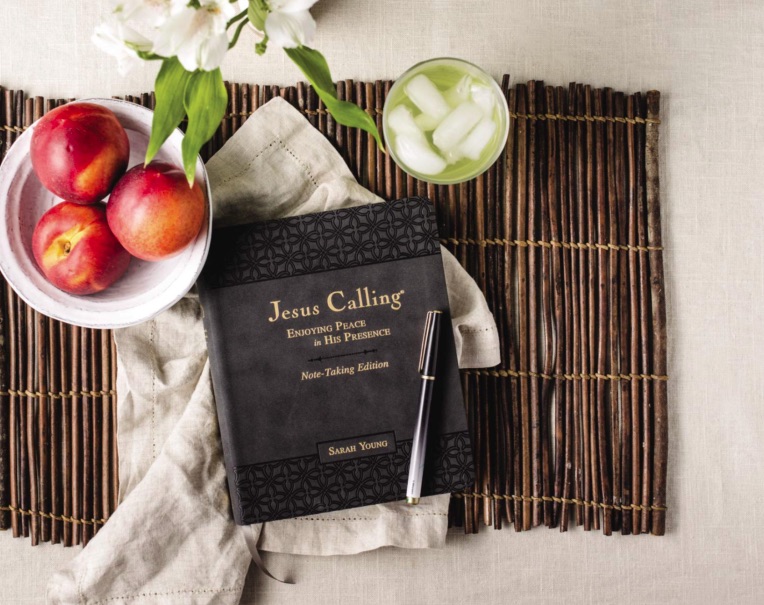
Many Jesus Calling readers have expressed that they have written notes in the margins of their own Jesus Calling, remembering important life moments and prayer requests. Now, there’s a new note-taking edition of Jesus Calling! It has the same great 365 devotions with full written-out scripture verses, and a new layout that leaves space for journaling and recording those inspirational thoughts and memories.
Receive your free sample of the note-takers edition of Jesus Calling.
Narrator: For most of her early years, Rebecca Alonzo grew up in the shadow of police lights flashing outside of her home. In the ‘70s, Rebecca’s parents were ministers in a small town in North Carolina, where they crossed paths with one of the town’s richest and most powerful citizens, a man who didn’t appreciate anyone who didn’t yield to his iron fist. This man began to terrorize Rebecca’s family, and the threats escalated until one day, the Nichols family’s suffering was brought to a devastating peak. Sifting through the aftermath, Rebecca took cues from her parents, who had always prayed for the man who was actively persecuting her family, and Rebecca herself would find out what it would take to come to a place of forgiveness for someone who had ultimately shattered her life.
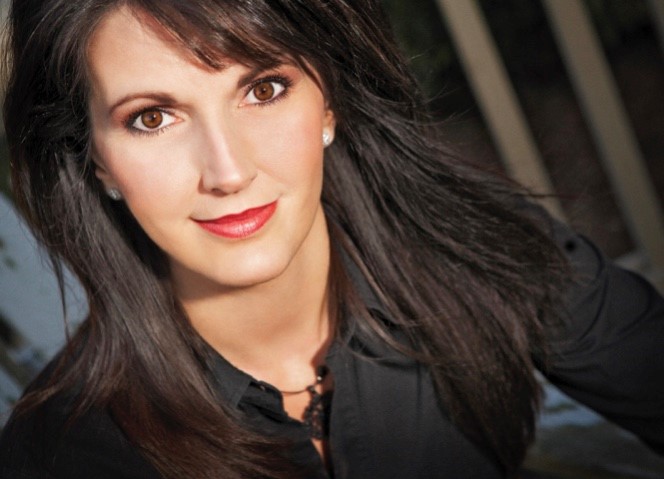
Rebecca Alonzo: My name is Rebecca Alonzo. I am a wife and a mom. I’m also an author and a speaker and I live in Franklin, Tennessee.
A War Begins
My mom and dad were evangelists before they settled down to have a family, and they were asked to come and speak in a little town called Cellar’s Town in Whiteville, North Carolina. And so after they spoke at this church, they were asked to stay on as pastors. And a few months later, I was born into this new church, new community. It was a farming community, the church was just a wonderful church, and they supported my mom and dad.
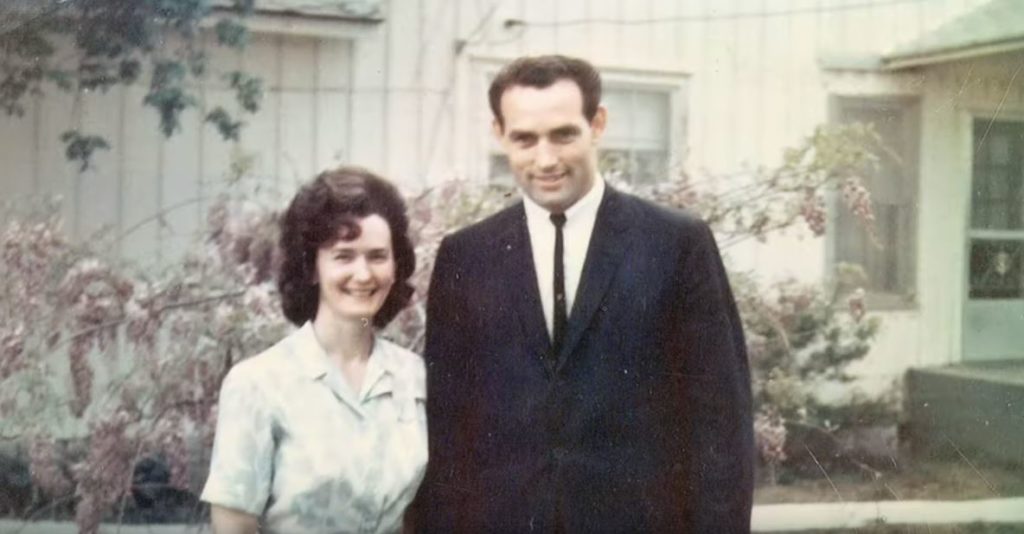
But we did have one man that attended the church, he was not a member. He attended the church and his name was Mr. Watts, and he sat in pew number seven every Sunday, and this man was a very controlling man. He was very wealthy. He was kind of like the godfather of that community, where he lent money to the farmers and just had a lot of control. And so my mom and dad came in, and my dad began to set up order in the church, and said, “If you want to vote on church business, you need to be a member of the church.” And so this man was not a member, and that removed his self-appointed power in the church.
And then my dad removed his wife as his church secretary, because Mr. Watts was writing a check for the offering and getting the tax deduction and taking the cash. So that was illegal—my dad removed her. The wonderful community and peace loving community that we were in all of a sudden turned into a war zone.
We began to receive threatening letters in the mail. And one of the letters read, “You will leave Cellar’s Town walking, crawling, dead, or alive.” So, it was serious threats. We began to get harassing phone calls, thirty to sixty a day before caller I.D. My dad would answer the phone. He didn’t know if it was our family, who were 700 miles away in Alabama, and my mother’s family was from Louisiana, or if it was a church member that needed help.
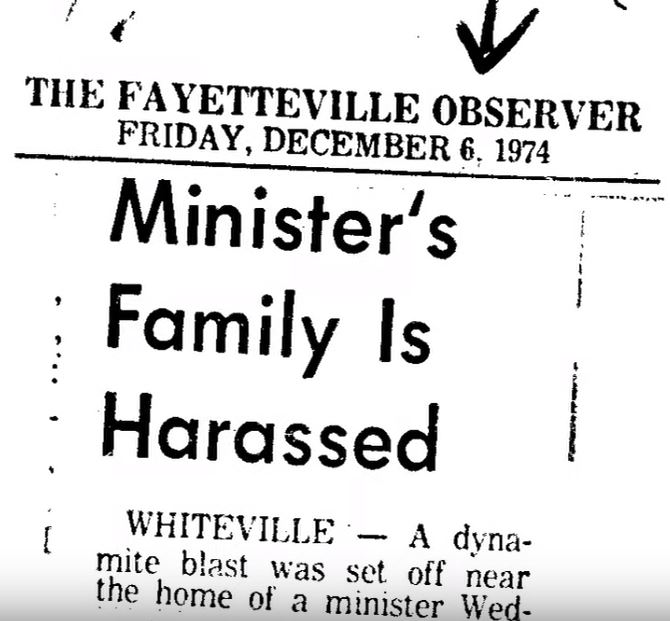
And then within five years, my brother Daniel was born. And not only did Mr. Watts come to church every Sunday morning and sit in pew seven and keep a tab on what was going on with the church and with everyone, but he lived across the street from our home. So if we would go on vacation, he would get these men he would hire who were ex-cons that could just make easy money from him, paying them off to torment our family. They would break into our house while we were on vacation and just destroy it. And then it escalated to these men sneaking into our yard at night. They would slash our tires, they would cut our phone lines, and then they would drive by our house and shoot at our house. So by the time I was four years old, I had bullets flying past my head, and my mom and dad just yelling out, “Get down, Rebecca, get down!”
So when these men began doing the drive-by shootings, they realized that my dad was not going to leave, then Mr. Watts upped the ante to dynamite explosions. So they would sneak in the cornfields behind our house at night. And I was told as a little girl, “If you hear tires squeal, get down,” because they would tie dynamite sticks to the corn stalks, run a long fuse out, and then jump in their car on the side of a side road and take off. And then a few seconds later, boom, this huge explosion would go off that could be heard miles down the street. So then it wasn’t just our family that was being terrorized, it was the community. The children in the community were terrified, especially at night.
And I was scared to death to go to sleep at night as a little girl. And so my mom and dad would always kneel next to my bed. We got down on our knees and we prayed that classic children’s prayer, “Now I lay me down to sleep, I pray the Lord my soul to keep. If I should die before I wake up, pray the Lord my soul to take.”
So I meant that prayer, like, if I should die before I wake, because I didn’t know if I was going to wake up in my bed, or if I was going to wake up in heaven.
“I didn’t know if I was going to wake up in my bed, or if I was going to wake up in heaven.” – Rebecca Alonzo, on living through harassment as a child by a fellow townsperson
We had ten dynamite bombings go off around our church and our house. And so, you know, the FBI were called in, ATF were called, and that just got the police force’s attention, like, “This is escalating. We need help. We need these guys to be caught now before they kill our family.”
A Family Shattered Forever
And so after five years of this at the hands of Mr. Watts, my mom’s friend—one of her best friends—called her one day and said that her husband, who my mom and dad had reached out to to try to help him through alcoholism and abuse, what he was putting this family through. She called my mom and explained to her that he had beaten her badly the night before and threatened her and her baby. And my mom said, “Well, you know, just come stay with us, come to our house and I’ll help you take care of the baby.” And so she came to our house.
Well, Mr. Watts found out that this friend was at our home, and he sent some of his guys over to Mr. Williams’ house, her husband’s house, who was already drunk, who was already, you know, enraged, and just fed him some lies to just get him all stirred up. And he said, “Aren’t you going to go after that wife? She’s over there at that preacher’s house. Aren’t you going to get your wife? She belongs at home with you.” So they just got him so stirred up that he barged into our house, 1978 Easter weekend. We’d just sat down to eat and say the blessing. And Mr. Williams walked into the house, barged into our home with three guns, tons of ammunition. And I was seven. My brother had just turned three, Daniel had just turned three. And we watched as this man shot our parents right in front of us. And chaos ensued. Everyone was screaming, my poor dad was shot twice, and one of the bullets went into his left hip, knocking him to the ground. My mom was shot once, but it clipped her heart and she went to heaven that day.
And that just really shook our world to lose our mom like that and to see our dad wounded and just the loss of my mom, who was such a shining light. Everyone loved her. She just really loved people. She was a sweet Christian woman who grew up in a Christian home. And that’s all she ever knew was loving God and serving people.
And so when that loss happened and my dad lost his best friend, his partner in ministry, his wife, the mother of his children, he had already been struggling with paranoia and some nerve problems from the drive-by shootings, some of the dynamite explosions, and all of that. And so when he lost our mom, it just pushed him over to a place of utter hopelessness.
And so we left our church. We left our community. We left our church family, my school, packed up and moved to Alabama and tried to start over without mom. I had my first birthday without her the next month. You know, I turned eight years old next month. And it was the strangest thing to not have her walk around the corner with a cake in hand, and Daniel being three and being a mama’s boy and saying, “Mommy, Mommy, where are you?” And just walking around the house looking for Mom. So, it was the darkest time in our life, losing our mom, and dad losing his wife, and him being in and out of hospitals.
And seven years after the shooting, God healed my dad, but it wasn’t the way that we were asking for the healing. He completely healed my dad by taking him home to heaven.
My brother and I had gone to school that day and like any other school day, my dad was away in a hospital again. We were waiting for him to come home, as he always did. And my family got a call that morning that our dad, who was only forty-six years old, had nothing physically wrong with him except some heart damage from the bombings. He did have some damage there. But besides that, nothing life-threatening. But the call came that he had passed away that morning from a blood clot going to his heart.
And that is when my life completely shattered. By this time, I was fourteen, my brother was nine. You know, it was like all that we had gone through as children was so difficult, so hard. But I had my dad. And I wanted him whether he was well or broken. It didn’t matter to me if he was broken. But when I lost my hero—when I lost that covering, when I lost that protector, when I lost my adoring father, oh, wow. It just spun me into two years of really being angry at God. And I said, “Lord, Mom, when she died, a man shot her and took her life. But when dad died, Lord, You took him.”
“When I lost my adoring father, oh, wow. It just spun me into two years of really being angry at God. And I said, ‘Lord, Mom, when she died, a man shot her and took her life. But when dad died, Lord, You took him.’” – Rebecca Alonzo
Healing Begin With Forgiveness
I really came to a place of blaming God and I went to church and I smiled and I did the church thing and, you know, I still loved God, but the pain was bigger than the love at that moment. And so I had this war going on inside of me where I was like, “Lord, I know you’re good, but it doesn’t feel like you’re good right now.” And so He let me wrestle with Him for two years. And then I finally realized, I need God more than I need to be mad at Him. I need Him more than I need to blame Him, I need His wisdom, I need His direction, I need His comfort.
“I need God more than I need to be mad at Him. I need Him more than I need to blame Him, I need His wisdom, I need His direction, I need His comfort.” – Rebecca Alonzo
And so I had to realize and revisit that Dad forgave the people that terrorized us for five years. He forgave Mr. Watts and his accomplices. He forgave the shooter, who was a friend of our family. And now I was having to forgive God. Not that He needs our forgiveness, but I was having to step into a place of—after two years of wrestling with Him, being mad at Him—God, I surrender. I surrender to you. I surrender the pain. I surrender the blame. I surrender the loss. I surrender all the why questions to you, God.
And then when I made room in my heart for those things to get out, that’s when the healing really began for me of the trauma, the loss, the terrorism, all of it. And I realized Wow, it takes energy to hold on to anger. It doesn’t matter how many things we do to try to ignore it or stuff it down. We will never have that peace that we need.
“It takes energy to hold on to anger.” – Rebecca Alonzo
This is Jesus Calling from September 23rd. It says:
Walk with Me in the freedom of forgiveness. The path we follow together is sometimes steep and slippery. If you carry a burden of guilt on your back, you are more likely to stumble and fall. At your request, I will remove the heavy load from you and bury it at the foot of the cross. When I unburden you, you are undeniably free! Stand up straight and tall in My Presence so that no one can place more burdens on your back. Look into My Face and feel the warmth of My Love-Light shining upon you. It is this unconditional Love that frees you from both fears and sins. Spend time basking in the Light of My Presence. As you come to know Me more and more intimately, you grow increasingly free.
You know, we’ve heard people say bitterness is like drinking poison and waiting for the other person to die. You know, we think that we’re hurting them when we’re really hurting ourselves, and Ephesians 4:31 tells us what to do with bitterness. It says get rid of it, get rid of all bitterness, rage, anger, harsh words and slander, as well as all types of evil behavior. And so get rid of that and instead be kind to each other, tender-hearted, forgiving one another just as God through Christ has forgiven you.
God Answers a Prayer Decades Later
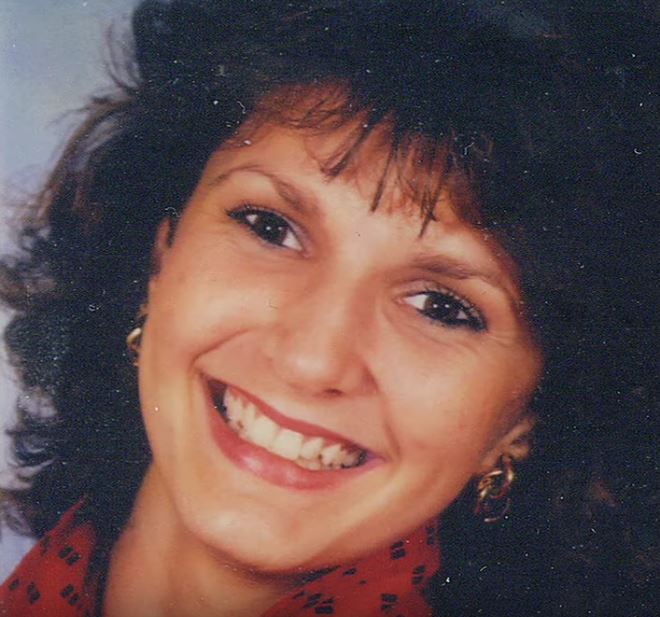
Before I went away to college, we got a phone call one day, and Aunt Dot answered the phone and she said, “It’s Mr. Watts on the phone.” Well, years before that, he had been indicted by a federal grand jury and sentenced to prison for fifteen years for the bombings. He was never connected to the murder in the shooting that day. But an FBI agent had stayed on the case after we moved away, and worked on and worked on it. And finally, Mr. Watts was convicted by a federal grand jury and sent to prison, so I’m thinking, Okay, it’s been about five years and I guess he gets a phone call in prison or whatever and I’m his phone call today. And so I get on the phone and I say, “Hello.”
And he said, “Hello, Becky, this is Mr. Watts,” with this deep, gruff voice that I remembered as a little girl. He said, “I have to ask you a question.”
I said, “Okay.”
He said, “I can’t live the rest of my life without knowing if you will forgive me for what I did to your family.” And he sat on the phone and he wept, and he said, “I am so sorry.”
Now this is a man that hated my family, hired people to shoot at us, put dynamite explosions around our house. He was the mastermind behind the shooting and my mother’s murder. And he said, “I’m so sorry for what I did. Your dad was a good man.” I mean, that just was unbelievable to hear those words come out of his mouth.
And I said, “Mr. Watts, my brother and I, my family, forgave you years ago. We forgave you years ago.”
And so a few years later, he passed away from cancer. And I thought, Wow, can you imagine my mom and dad walking down the streets of heaven? They turned the corner and bam, there’s Mr. Watts?
Romans 8:28 says that we know that God causes everything to work together for the good of those who love God and are called according to His purpose. When people would ask my parents, “Why didn’t you leave? Why did you stay?” My mom would say from the deepest places of her heart, she said, “Jesus gave His life for me and I’m willing to do the same.” And John 15:12 speaks of that where Jesus says, “This is my commandment, love each other in the same way I have loved you. There is no greater love than to lay down one’s life for one’s friend.” And I believe that Mom did that, that she and Dad laid their lives down. And so that’s what I had to step into, was a trust and a knowing that even though we suffered at the hands of a madman and terrorism for over five years and the loss of our parents, He knows everything that we’ve been through. He knows every thought that we struggle with. He knows every pain that we carry in our hearts. And every time God kept His promise. He said, “I will never leave you. I will never forsake you.”
“He knows everything that we’ve been through. He knows every thought that we struggle with. He knows every pain that we carry in our hearts. And every time God kept His promise.” – Rebecca Alonzo
Narrator: You can read more about Rebecca’s story and her incredible journey to forgiveness in her book, The Devil in Pew Number Seven. Learn more at rebeccaalonzo.com.
If you’re inspired by stories about how God can bring good out of each of our stories, check out our interviews with Rebecca Bender and Patti Callahan.
Narrator: Next time on the Jesus Calling Podcast, we speak with entrepreneur Zim Flores. Zim is the former CEO of Travel Noire. And when Zim sold her business, she discovered that a huge chunk of her identity was suddenly gone—sending her into a period of reflection on who she was and what she was living for.
Zim Flores: I had spent all of this time tying my identity to this business, that when the business was no longer there, I almost fell into this identity crisis where I think a lot of us—as we think about who we are—we kind of place these tent poles with other people or we place these tent poles with, you know, the towns that we grew up in or the jobs that we have or how much money we own or all of these different things that when those things go away, it’s really hard for us to grasp who we really are.
